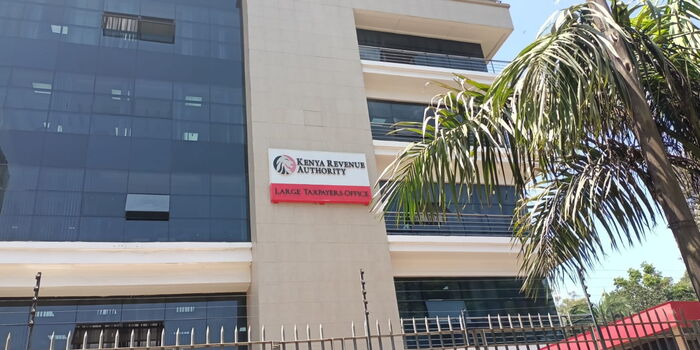KRA collects Sh83 billion less the target for financial year 2023/24

Official data shows revenue collection was 95.5 per cent of the revised annual target of Sh2.49 trillion, leaving a gap of Sh83 billion.
The Kenya Revenue Authority (KRA) collected Sh2.407 trillion in the financial year 2023/24, which ended on June 30, compared to Sh2.166 trillion in 2022/23.
Official data shows revenue collection was 95.5 per cent of the revised annual target of Sh2.49 trillion, leaving a gap of Sh83 billion.
Compared to the initial target of Sh2.787 trillion that was set in the budget unveiled in June last year, the collections missed out by Sh380 billion. The taxman blamed the target miss on the multiple economic shocks experienced during the year that affected its revenue mobilisation efforts.
More To Read
- Weak taxation of wealthy costs Kenya Sh130 billion annually, report finds
- Developing countries’ debt servicing cost hit 50 year high on high interest
- Ex-Nairobi governor Sonko gets relief as Tribunal directs KRA to unfreeze his bank accounts
- CBK warns of rising debt distress, urges fiscal coordination
- National Treasury secures Sh437.8 billion loan to plug budget deficit
- Businesses granted 30-day relief on long-stay container charges at Mombasa port
These included the depreciation of the shilling against the US Dollar, rising bank lending rates, and international conflicts that disrupted supply chains.
Under the review period, exchequer revenue grew by 9.5 per cent after KRA collected Sh2.223 trillion compared to Sh2.030 trillion in the previous financial year.
This translates to a performance rate of 95.8 per cent.
Additionally, KRA collected Sh184.036 billion from other government agencies, mainly at the ports of entry, reflecting a 35 per cent growth compared to the previous financial year.
The aforementioned included revenues from Road Maintenance Levy, Air Passenger Service Charge, Aviation Revenue, Petroleum Development Fund, Petroleum Regulatory Levy, and Housing Levy, among others.
Customs and domestic tax performance
Domestic taxes registered a revenue growth of 14.4 per cent after the taxman collected Sh1.611 trillion against a target of Sh1.677 trillion.
Customs revenue recorded a performance rate of 94.6 per cent with a collection of Sh791.368 billion, translating to a revenue growth of 4.9 per cent compared to the same period in FY 2022/2023.
"Despite overall import values increasing by 11.7 per cent, oil and non-oil tax performance was in part affected by growth in exemptions and remissions, which grew by 23.8%, driven by special exemptions accorded to some food commodities," KRA says.
"These products account for 40.8 per cent of exemptions accorded in FY 2022/2023. The special exemptions were part of the government's strategies to mitigate against adverse effects of drought and reduce the cost of living."
Further, there was low consumption of petroleum products in the country, especially diesel and petrol, which was in part exacerbated by high retail prices for the better part of the year in focus, the taxman adds.
 President William Ruto (right) during the filing of his tax returns at the KRA Headquarters, Nairobi on May 26, 2023. (Photo: PCS)
President William Ruto (right) during the filing of his tax returns at the KRA Headquarters, Nairobi on May 26, 2023. (Photo: PCS)
Performance of key tax heads
Domestic VAT collection stood at Sh314.2 billion against a target of Sh307.8 billion, reflecting a growth of 15.3 per cent compared to the previous year.
VAT is an indirect tax that is paid by the person who consumes taxable goods and taxable services supplied in Kenya and/or imported into Kenya.
Its collections surpassed the target by Sh6.334 billion, with the growth attributed to the implementation of the Electronic Tax Invoice Management System (eTIMS).
KRA says the electronic invoicing system has enhanced compliance among VAT-registered taxpayers.
Notably, the domestic VAT average monthly collection growth scaled up to 17.5 per cent in the year under review.
"The monthly average collection stood at Sh26.25 billion in the second half of FY 2022/23, after the introduction of eTIMS, against the monthly average collection of Sh23.6 billion collected in the first half of FY 2022/23, before the rollout of eTIMS," KRA says.
"Currently, monthly average domestic VAT collections stand at Sh28.7 billion in FY 2023/24."
Capital Gains Tax, which is applicable on the sale of immovable property or on the transfer of shares for companies that are not listed on the Stocks Exchange, registered a 49.5 per cent growth after collecting Sh8.4 billion against a target of Sh7.7 billion.
This signifies a performance rate of 108.7 per cent after collecting a surplus of Sh671 million.
Corporation Tax, payable by companies or corporate entities, performed at 93.4 per cent with a collection of Sh278.2 billion.
This is a growth of 4.9 per cent over the last financial year and was largely driven by increased remittances from sectors like Wholesale & Retail Trade (10.0%); Electricity, Oil, & Gas (11.0%); Transport & Storage (118.5%); Accommodation & Food Service (96.6%); and Education (29.5%).
These sectors contributed 20.5 per cent of the corporation tax.
 A file picture of the Times Tower in Nairobi, the headquarters of the Kenya Revenue Authority. (Photo: KRA)
A file picture of the Times Tower in Nairobi, the headquarters of the Kenya Revenue Authority. (Photo: KRA)
On the downside, key sectors like finance & insurance, information & communication, and manufacturing experienced declines in installment remittances of 2.4, 12.3, and 13.0 per cent respectively.
This is attributed to reduced profitability reported by taxpayers across these sectors, explained by an increase in provisioning for non-performing loans in the banking sector that spiked as a result of high default rates.
Forex losses arising from a depreciated exchange rate, especially in the first half of FY 2023/24, weak demand for manufactured goods affected by high retail prices that were a result of high input costs (mainly import driven) and high energy costs are the other factors.
Pay As You Earn (PAYE) registered a growth of 9.7 per cent after collecting Sh543.2 billion, with the performance mainly driven by remittances from private firms and the public sector, which grew by 13.4% and 3.7% respectively.
Domestic Excise, the tax imposed on goods and services manufactured in the country or imported into Kenya, recorded a growth of 8.1 per cent in FY 2023/24, with a collection of Sh73.6 billion, which translates to a performance rate of 99.6 per cent.
The performance is attributed to the growth in revenue from manufacturers of soft drinks (12.2%); bottled water (9.7%); beer (16.2%); and tobacco (1.9%).
Customs Revenue: Non-oil taxes recorded a growth of 1.9% after collecting Sh490.6 billion.
On the other hand, oil taxes grew by 10.3 per cent after collecting Sh300.8 billion.
The Electronic Tax Invoice Management System (eTIMS) had a total of 280,663 VAT-registered taxpayers onboarded at the end of the review period, which led to remittances of Sh314.2 billion.
On the tax amnesty programme, Sh43.9 billion was collected after 2,617,111 taxpayers were granted amnesty in the financial year 2023/2024.
Top Stories Today















































